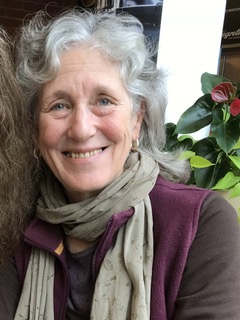By ANNA GYORGY
Originally published in the Montague Reporter on November 15, 2018.
BERLIN This is the first in a series of “dispatches” to this community during my time in Germany. The trip, supported by the Traprock Center for Peace & Justice, of which I am part, will continue through December, when I will write about the upcoming UN Climate Change Conference, COP 24. This large international meeting will take place from December 2 to 14 in Katowize, a major coal and industrial region of Poland, not too far from Berlin, where I will be watching.
The decision to travel to Germany just days after our midterm elections landed me in a weekend of remembrance of the past, mixed with anxiety for the future.
It was a lot, as I carried with me recent events in our country: pipe bombs (“real” or not) sent to Democratic politicians and Trump-identified “foes”; yet another mass shooting; yet another focused assassination in a house of worship, this one with a clear anti-Semitic motivation; the racist murder of two Black shoppers in Kentucky; fires raging over hundreds of miles in California.
Oh yes, and the elections, which brought high voter turnout and some important new faces and politics to the fore, while divisions remain deep.
So what was happening in Germany?
November 9, a Friday this year, has been an important double anniversary here since 1989, when after months of peaceful mass protest in East Germany, the Berlin Wall was opened and 45 years of physical separation began to end.
But when I lived in Germany, November 9 was also an evening to gather with others at a simple monument in Bonn-Beuel marking the Jewish synagogue destroyed on that date, along with a much larger one in nearby central Bonn, and others throughout the country. In Bonn only the simplest, symbolic signs of these losses are to be seen.
My US friends call the coordinated mass destruction of Jewish houses of worship in Germany on November 9 and 10, 1938 Kristallnacht, or “night of broken glass.” But in Germany, it’s the more explicit and terrifying Reichsprogromnacht: “the progrom night of the realm.”
This year marked the 80th anniversary of this state-sponsored violence, which led to so much more.
But this was not all. The weekend continued with a focus on the 100th anniversary of November 11, 1918, when, after four bloody years, the fighting of World War I finally stopped. At 11 o’clock that day – after all the mass slaughter and use of new, “modern” weapons of war, like chemical gas and bomb-dropping airplanes – the trenches were suddenly still.
World heads of state met at the invitation of French president Emmanuel Macron to memorialize the end of that war. Most – but notably not Trump – stayed for a discussion on peace, where the French leader criticized nationalism as not true patriotism.
For amidst memories of the hard-won peace of 1918, which redrew the boundaries of many countries, are anxious fears of increasing nationalist movements, as politicians challenge the post-World War I (and then post-World War II) efforts at international cooperation to prevent a similar war in the future. Right-wing movements are strong in Hungary and Poland, and growing in Germany and beyond.
And then the women!
The day after this sad and somewhat ominous remembrance of a vicious international struggle, Germany marked the hundredth anniversary of German women receiving the right to vote. This was passed right after war’s end, and a couple years before the United States followed suit in 1920.
An avid radio listener, I was moved first by memories of the war’s brutality and end, and of how the peace treaty’s terms contributed to the rise of fascism in Germany. Then on to the happy news for women, despite the knowledge that many then voted for Hitler.
Additional coverage of the much longer struggle for equal rights in Germany reveal that it’s not over yet. For instance, the number of women parliamentarians in the German Bundestag (Parliament) fell from 36.3% to 31% in last year’s elections.
I guess we can say that we are working on it in the US, where after this election the House of Representatives will increase its female membership from 104 (19.4%) to 126 (23.6%).
In the “Heart of Europe” As Things Heat Up
The situation at Katowice this year promises to be much different than last year’s Climate Change Conference, when it was held in Bonn. Thousands of people gathered before the COP 23 for meetings and demonstrations for climate action and justice. A short video of the situation then, still timely today, can be seen at the Traprock website (www.traprock.org).
The October 2018 Intergovernmental Panel on Climate Change (IPCC) Special Report on Global Warming has urged efforts to limit global warming to 1.5º C (2.7º Fahrenheit), rather than 2º C, to prevent major ecological damage.
Efforts in this direction must happen in Katowice.
However, legislation passed by the right-wing Polish government allows searches of activists’ personal data, and limits public demonstrations to those previously approved. (See Kate Aronoff’s article, “Poland’s New Surveillance Law Targets Personal Data of Environmental Advocates,” at theintercept.com/2018/07/02/cop24-poland-surveillance-law.)
Time is short, and change must come. I look forward to reporting on the chances of seeing positive action on both democracy and climate justice.
